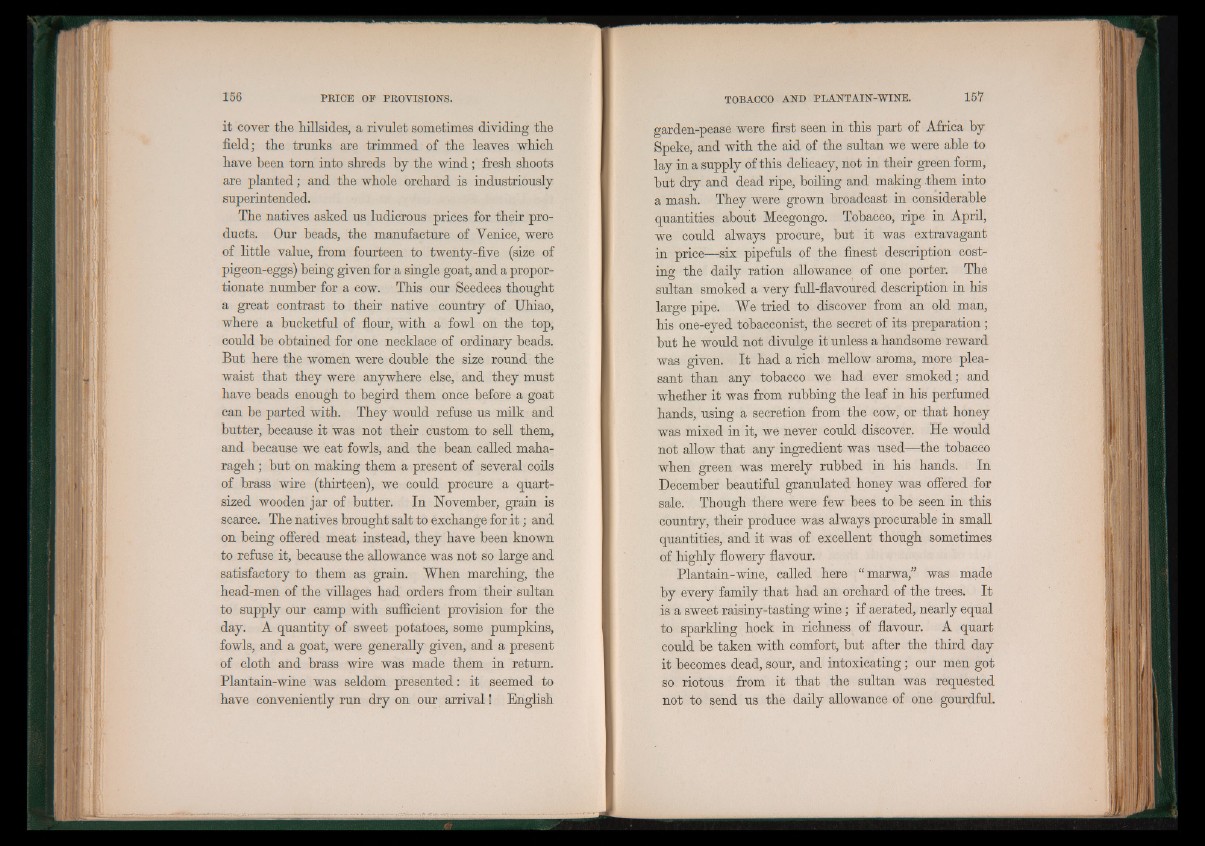
it cover the hillsides, a rivulet sometimes dividing the
field; the trunks are trimmed of the leaves which
have been torn into shreds by the wind ; fresh shoots
are planted; and the whole orchard is industriously
superintended.
The natives asked us ludicrous prices for their products.
Our beads, the manufacture of Venice, were
of little value, from fourteen to twenty-five (size of
pigeon-eggs) being given for a single goat, and a proportionate
number for a cow. This our Seedees thought
a great contrast to their native country of Uhiao,
where a bucketful of flour, with a fowl on the top,
could be obtained for one necklace of ordinary beads.
But here the women were double the size round the
waist that they were anywhere else, and they must
have beads enough to begird them once before a goat
can be parted with. They would refuse us milk and
butter, because it was not their custom to sell them,
and because we eat fowls, and the bean called maha-
rageh; but on making them a present of several coils
of brass wire (thirteen), we could procure a quartsized
wooden jar of butter. In November, grain is
scarce. The natives brought salt to exchange for i t ; and
on being offered meat instead, they have been known
to refuse it, because the allowance was not so large and
satisfactory to them as grain. When marching, the
head-men of the villages had orders from their sultan
to supply our camp with sufficient provision for the
day. A quantity of sweet potatoes, some pumpkins,
fowls, and a goat, were generally given, and a present
of cloth and brass wire was made them in return.
Plantain-wine was seldom presented: it seemed to
have conveniently run dry on our arrival! English
garden-pease were first seen in this part of Africa by
Speke, and with the aid of the sultan we were able to
lay in a supply of this delicacy, not in their green form,
but dry and dead ripe, boiling and making them into
a mash. They were grown broadcast in considerable
quantities about Meegongo. Tobacco, ripe in April,
we could always procure, but it was extravagant
in price—six pipefuls of the finest description costing
the daily ration allowance of one porter. The
sultan smoked a very full-flavoured description in his
large pipe. We tried to discover from an old man,
his one-eyed tobacconist, the secret of its preparation;
but he would not divulge it unless a handsome reward
was given. It had a rich mellow aroma, more pleasant
than any tobacco we had ever smoked; and
whether it was from rubbing the leaf in his perfumed
hands, using a secretion from the cow, or that honey
was mixed in it, we never could discover. He would
not allow that any ingredient was used—the tobacco
when green was merely rubbed in his hands. In
December beautiful granulated honey was offered for
sale. Though there were few bees to be seen in this
country, their produce was always procurable in small
quantities, and it was of excellent though sometimes
of highly flowery flavour.
Plantain-wine, called here “ marwa,” was made
by every family that had an orchard of the trees. It
is a sweet raisiny-tasting wine; if aerated, nearly equal
to sparkling hock in richness of flavour. A quart
could be taken with comfort, but after the third day
it becomes dead, sour, and intoxicating; our men got
so riotous from it that the sultan was requested
not to send us the daily allowance of one gourdful.